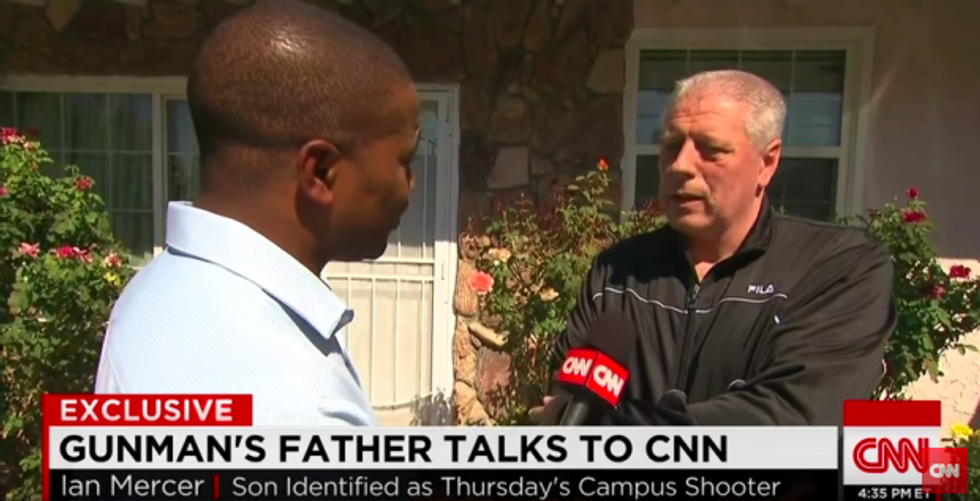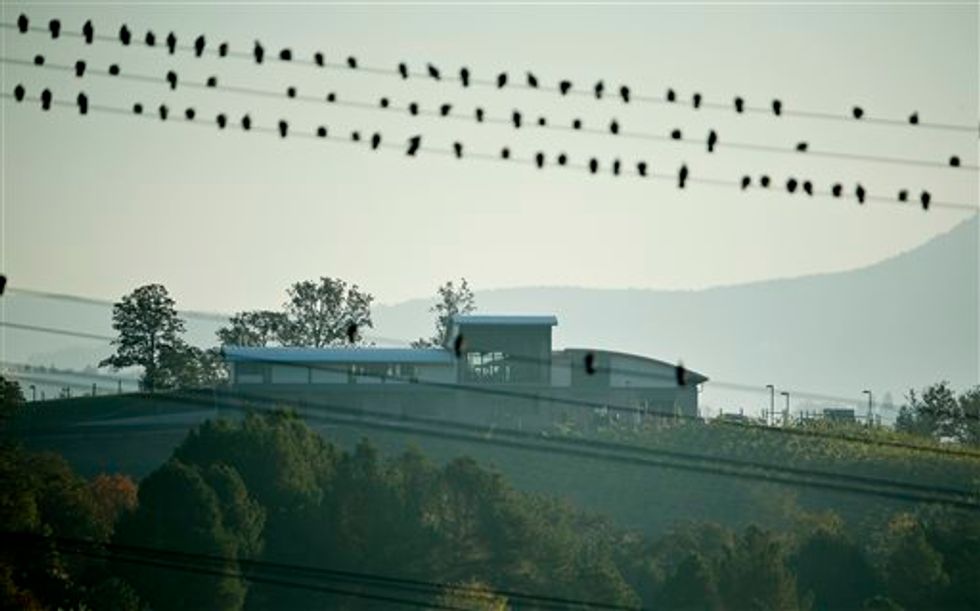
© 2025 Blaze Media LLC. All rights reserved.
It's not foolproof, but it's a start.
I've noticed that the answers in life are often simple but rarely easy. For instance, if I want to lose 10 pounds, the simplest but hardest solution is to eat less and jog more. The most complicated but easiest solution is to consult with doctors and take pills and complain about my thyroid and eventually give up and start a "fat acceptance" group. A lot of people these days choose the latter. It's time consuming and it won't accomplish much, but at least it can be done from the couch.
We tend to see this mindset manifest itself in dramatic fashion following any sort of national tragedy. We search desperately for answers, and the people tasked with providing them generally come up with a lot of complex laws and policies and political proposals, but nothing that even comes close to addressing the actual problem.
[mattwalsh-social-instory]
That's what happened yet again this past week, after Chris Harper-Mercer walked into a community college in Oregon and slaughtered nine people. Immediately, the usual suspects manned their usual battle stations and started spouting their usual talking points about "gun control" and "mental health" and so on. Obama gave a speech mere hours after the attack and called for greater restrictions on the Second Amendment. Many others joined in his chorus.
Of course, the problem with this answer is that it isn't an answer. Even if we could completely remove the pesky issue of constitutional liberties from the equation, even if it were possible to cure violence by getting rid of one particular type of weapon, even if we ignore the fact that the deadliest school attack in history happened 90 years ago and was carried out not with guns but with explosives, and even if we look past the studies showing that gun control laws are counterproductive, gun control would still be basically impossible.
Obama likes to say there are enough guns in this country to arm every man, woman, and child — not exactly accurate, but close enough — so what does he plan to do? Confiscate 300 million firearms? With what army? Literally, he would need the Army to do that. And since many law-abiding gun owners are current and former military, one wonders how that would play out.
Well, I already know. It wouldn't. It's not going to happen. It's an expensive, convoluted, extravagant, impractical, unconstitutional, disastrous, ridiculous, impossible solution. But it's easy. Not easy to do, easy to talk about. Easy in the abstract. Easy to use as a scapegoat. It's easier for us as a society to place the blame on the tool a murderer uses instead of focusing on why he chose to be a murderer in the first place. And if we do discuss why, it's easiest to simply and generically conclude that he's "crazy" or "nuts." A crazy nut with a gun, that's all. More pills! Fewer guns! That's the ticket! We find great comfort in this — pawning the solution off to politicians and drug companies — because it saves us from assuming any sort of responsibility ourselves.

This dynamic was morbidly illustrated by the shooter's own father, Ian Mercer, over the weekend. In an interview on CNN, he launched into an unprompted diatribe about gun control laws. His son shot and killed nine people and the first thing he apparently thought to blame was lax gun regulation. It was disturbing and difficult to watch him as he desperately reached for the closest available rationalization. He's wrong, but I feel for him. He didn't send his son to execute a classroom full of innocent people. He didn't want this to happen. He isn't the murderer. And although his son is the villain in this scenario, he is still a father dealing with the loss of a child. I can't imagine the utter and complete emotional desolation he must be experiencing. To make matters worse, in the midst of his overwhelming sadness, guilt, anger and grief, he's been asked to offer a diagnosis of his killer son on national TV. He retreated to gun control talking points because he didn't want to face the real questions. And I suppose we shouldn't blame him for not wanting to face them with a camera and a microphone shoved in his grill.
Still, I can't help but note that Ian Mercer was interviewed from the home he didn't share with his son. The shooter came from a divorced family. He lived with his mother. Same was true of Dylann Roof, who also slaughtered nine people. Same was true of Adam Lanza, who massacred 20 children a couple years ago. All came from broken homes. None was close with his father.
In all of these cases, the media and Obama — and this time even the perpetrator's father — diligently counted how many guns the killers had in their homes but failed to notice how many parents they had in their homes. That seems like quite a detail to overlook. Before we wonder if a guy's access to guns turned him into a murderer, you'd think we'd pause to reflect on whether his lack of access to his own father might have played a role.
These mass killings happen with relative frequency, and they are usually not perpetrated by men who grew up in strong families with both biological parents present. Divorce and fatherlessness are the two elements that tie most of these cases together. No other factor — gun laws, politics, racism, etc. — comes close. Dylann Roof was a white guy killing black people, Vester Flanagan was a black guy killing white people. Their races were different, yet the one line that cut right through both of them was divorce. Even in cases where the killer's parents are still married, a closer inspection will often reveal a home filled with instability and chaos.
Indeed, it's not just the high publicity tragedies that seem to always involve broken homes. The statistics across the board are staggering and conclusive: 90 percent of homeless kids are from fatherless homes; 63 percent of kids who commit suicide are from fatherless homes; 71 percent of high school dropouts are from fatherless homes. Children from fatherless homes are at a much greater risk of developing drug addictions and are four times as likely to be poor. Out of all the youths in prison, a full 85 percent are from fatherless homes. In the inner city where violence and drug abuse are rampant, four out of every five children are growing up without their biological fathers.
You name the societal ill or problematic group — from violent boys to promiscuous girls to everything in between — and right there in the middle you'll find broken homes, unstable families and absent fathers.
So why aren't we talking about this?
This latest brutal outburst prompted hundreds of articles about guns, but so far as I saw, precisely one article about families. Obama got up in front of the nation within hours of the attack and had a lot to say about laws and politics and those dirty Republicans, but not a word — not one single word — about the epidemic of divorce and fatherlessness. We're all running around trying to figure out why kids turn into murderers, drug users, prostitutes and thugs, but it's as if we've signed some kind of confidentiality agreement preventing us from ever suggesting that perhaps these issues can be mitigated by parents getting married, staying married and raising their children together.
It's not like this is even a debatable issue. Studies have proven time and time and time again that children suffer greatly when their families break apart. If I can be forgiven the indulgence of plagiarizing myself, I go back to a point I made in an article about the perils of gay adoption:
The psychological benefits of having a dad and mom in the home are clear and incontrovertible. Forty years of research into the subject demonstrates the inescapable and self-evident reality that children need fathers and mothers.Dr. Kyle Pruett, a professor of child psychiatry at Yale, says that babies can tell the difference between a male and a female by eight weeks of age:
This diversity, in itself, provides children with a broader, richer experience of contrasting relational interactions. ... Whether they realize it or not, children are learning at earliest age, by sheer experience, that men and women are different and have different ways of dealing with life, other adults and children.It's obvious that mothers and fathers play differently, communicate differently, prepare the children for life differently, take risks differently, and look at the world differently. These are not just assumptions, but cold, hard, indisputable scientific facts, backed by years of research and millenniums of human experience. Over 350 studies from over a dozen nations confirm the importance of a household with both parents present.
When looking at any indicator, from general happiness to professional success to educational achievement, the essential need for a child to have the input of a mother and a father is demonstrable and unmistakable.
Fathers and mothers both play an integral role in the spiritual and emotional formation of a child. Take one or both away, and there's a chance the child becomes emotionally and spiritually deformed. It's a very simple formula. There's no disputing it — just ignoring it — and I think we choose to ignore it for a few reasons.
For one thing, the left-wing cultural narrative requires us to deny the distinction between men and women, which means denying the distinction between mothers and fathers. According to progressivism, the nuclear, biological family is but one type of arrangement, one variant equal in every way to families with one mom or two moms or three dads or whatever, and none can be judged more ideal than the others.

Even though progressives obsess over organic milk and free-range chickens, they pretend that the natural, organic family — the family as it was meant to be — is in no way superior to the modified versions. But to connect violence to broken homes is to admit that (shock!) kids benefit from having mom and dad in the same house. Progressivism can make no such admission, so it continues blaming bad things on inanimate objects, rather than fatherlessness and divorce.
But for another thing, beyond ideology, I think we ignore the family's role in all of this because it hits, literally, too close to home. Some single mothers bizarrely see a discussion about fatherhood as an attack on them, and some men, especially divorced men, see the hand wringing over fatherlessness as an affront against them. Both groups make it impossible to have this conversation.
Meanwhile, the rest of us are equally hesitant to speak categorically in favor of the nuclear family. We know it's challenging and difficult to be a parent and a spouse. It takes a lot out of us. It requires so much of our time and our love and our money and our selves. There's pressure. There's stress. Sometimes, God forbid, we have to put other people above our own personal enjoyment. If we acknowledge that our kids need us, that they depend on our presence, that they require our full-time love and support, then we've backed ourselves into a corner. If the going gets tough, we have to stick around. If we feel unhappy one day, we have to gut it out and work through it. If we need a break from all this parenting and spousing stuff, we can't just leave. We minimize the importance of families to provide ourselves with an escape hatch, should we need it. We know that families are work, families are sacrifice, families are not designed solely to bring us pleasure and amusement every second of the day, and so we're terrified of professing our undying loyalty to it. These are scary propositions — all this duty and responsibility stuff. We'd rather not dwell on it. Let's get back to talking about gun laws and mental health, we think. That's a much more comfortable debate. Much more removed from our daily lives. It requires much less of us. Actually, it requires absolutely nothing — which is ideal.
I don't think all of our problems in society can be solved through stable families, but I do think that, if we want to address them, we should begin with the simple but hard things: staying married, raising our kids, being examples, instilling faith and values, teaching them how to be good people, etc. It's not foolproof, but it's a start.
We just have to be willing to do the work.
–
TheBlaze contributor channel supports an open discourse on a range of views. The opinions expressed in this channel are solely those of each individual author.
Want to leave a tip?
We answer to you. Help keep our content free of advertisers and big tech censorship by leaving a tip today.
Want to join the conversation?
Already a subscriber?
more stories
Sign up for the Blaze newsletter
By signing up, you agree to our Privacy Policy and Terms of Use, and agree to receive content that may sometimes include advertisements. You may opt out at any time.
Related Content
© 2025 Blaze Media LLC. All rights reserved.
Get the stories that matter most delivered directly to your inbox.
By signing up, you agree to our Privacy Policy and Terms of Use, and agree to receive content that may sometimes include advertisements. You may opt out at any time.






